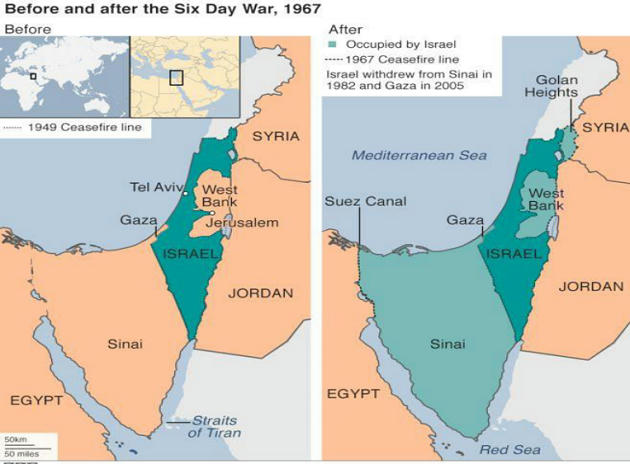Table of Contents


WAR
- The Six-Day War was a brief but bloody conflict fought in June 1967 between Israel and the Arab states of Egypt, Syria and Jordan.
- Following years of diplomatic friction and skirmishes between Israel and its neighbors, Israel Defense Forces launched preemptive air strikes that crippled the air forces of Egypt and its allies.
BACKGROUND
- The Six-Day War came on the heels of several decades of political tension and military conflict between Israel and the Arab states.
- In 1948, following disputes surrounding the founding of Israel, a coalition of Arab nations had launched a failed invasion of the nascent Jewish state as part of the First Arab-Israeli War.
- A series of border disputes were the major spark for the Six-Day War. By the mid-1960s, Syrian-backed Palestinian guerillas had begun staging attacks across the Israeli border, provoking reprisal raids from the Israel Defense Forces.
BACKGROUND
- In April 1967, the skirmishes worsened after Israel and Syria fought a ferocious air and artillery engagement in which six Syrian fighter jets were destroyed.
- In a show of support for his Syrian allies, he ordered Egyptian forces to advance into the Sinai Peninsula, where they expelled a United Nations peacekeeping force that had been guarding the border with Israel for over a decade.
- As the situation in the Middle East deteriorated, American President Lyndon B. Johnson cautioned both sides against firing the first shot.
WAR STARTS
- By early June 1967, Israeli leaders had voted to counter the Arab military buildup by launching a preemptive strike.
- On June 5, 1967, the Israel Defense Forces initiated Operation Focus, a coordinated aerial attack on Egypt. That morning, some 200 aircraft took off from Israel and swooped west over the Mediterranean before converging on Egypt from the north.
- After catching the Egyptians by surprise, they assaulted 18 different airfields and eliminated roughly 90 percent of the Egyptian air force as it sat on the ground. Israel then expanded the range of its attack and decimated the air forces of Jordan, Syria and Iraq.
WAR
- By the end of the day on June 5, Israeli pilots had won full control of the skies over the Middle East.
- Israel all but secured victory by establishing air superiority, but fierce fighting continued for several more days. The ground war in Egypt began on June 5.
- Over the next several days, Israeli forces pursued the routed Egyptians across the Sinai, inflicting severe casualties.
- On June 7, Israeli troops captured the Old City of Jerusalem and celebrated by praying at the Western Wall.
WAR
- On June 9, following an intense aerial bombardment, Israeli tanks and infantry advanced on a heavily fortified region of Syria called the Golan Heights. They successfully captured the Golan the next day.
- On June 10, 1967, a United Nations-brokered ceasefire took effect and the Six-Day War came to an abrupt end. It was later estimated that some 20,000 Arabs and 800 Israelis had died in just 132 hours of fighting.
- The leaders of the Arab states were left shocked by the severity of their defeat. Egyptian President Nasser even resigned in disgrace, only to promptly return to office after Egyptian citizens showed their support with massive street demonstrations.
AFTERMATH
- In Israel, the national mood was jubilant. In less than a week, the young nation had captured the Sinai Peninsula and the Gaza Strip from Egypt, the West Bank and East Jerusalem from Jordan, and the Golan Heights from Syria.
- Still wounded by their defeat in the Six-Day War, Arab leaders met in Khartoum, Sudan, in August 1967, and signed a resolution that promised “no peace, no recognition and no negotiation” with Israel.
- Led by Egypt and Syria, the Arab states later launched a fourth major conflict with Israel during 1973’s Yom Kippur War.
- Since 1967, the lands Israel seized in the Six-Day War have been at the center of efforts to end the Arab-Israeli conflict.
- Israel returned the Sinai Peninsula to Egypt in 1982 as part of a peace treaty and then withdrew from the Gaza Strip in 2005, but it has continued to occupy and settle other territory claimed in the Six-Day War, most notably the Golan Heights and the West Bank.
- The status of these territories continues to be a stumbling block in Arab-Israeli peace negotiations.
World History | Free PDF























 WhatsApp
WhatsApp